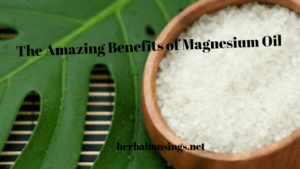Magnesium oil is a term for a mixture of a highly saturated solution of magnesium chloride in distilled water, which has a texture similar to oil. Using an oil spray is very convenient because it’s applied topically to your skin for fast absorption. Also, this allows your body to absorb what it needs as it needs it.
When you use a spray you can apply it where it’s needed, say for restless legs or muscle cramping, this way your whole digestive system doesn’t need to work hard for your legs or muscles to absorb the needed mineral. What is magnesium?
It’s the eighth most abundant mineral on earth, and the third most abundant in sea water. To me, the most important fact is it’s the fourth most abundant mineral in the human body and it is necessary in over 300 reactions within the body. This is so incredible!
Magnesium oil is used to soothe pain nearly anywhere in your body, from muscle cramps to joint aches and pains.
It also relieves stress, maintains youthful skin and relaxes your body. Thereby promoting good sleep and aiding your general health and vitality.
The most effective way to increase overall magnesium levels in your body is to apply magnesium oil to your skin. For instance if you have any digestive issues, this is very beneficial. Topically applied magnesium chloride enhances skin barrier function, decreases inflammation, speeds wound healing and promotes skin cell hydration.
Best of all, magnesium oil spray is very simple and inexpensive to make. I have included the recipe I use at the end of this article.
Low Magnesium Levels
Low levels are often diagnosed by the symptoms alone. If you have more than one of these symptoms or more than five, it is highly likely that you could benefit from magnesium supplementation. The following symptoms can point to low magnesium levels:
- Inability to sleep or insomnia
- Irritability
- Sensitivity to noise
- Mental disturbances
- Anxiety, depression or restlessness
- Muscle soreness or spasms
- Infertility or PMS
- High levels of stress
- Headaches
- Heart “flutters” or palpitations
- Fatigue or unusual tiredness
- Coldness in extremities
- Fuzzy brain or difficulty concentrating
- Allergies and sensitivities
- Lack of appetite
- Back pain
- Body odor
- Bad short term memory
- Poor coordination
- Insulin resistance
- Carbohydrate cravings
- Constipation
- Frequent cavities or poor dental health
- Gut disorders
- Kidney stones
- Thyroid problems
Magnesium is necessary for hundreds of functions within the body, but is especially important for:
- Gives rigidity AND flexibility to your bones
- Increases bio-availability of calcium
- Regulates and normalizes blood pressure
- Prevents and reverses kidney stone formation
- Promotes restful sleep
- Helps prevent congestive heart failure
- Eases muscle cramps and spasms
- Lowers serum cholesterol levels and triglycerides
- Decreases insulin resistance
- Can prevent atherosclerosis and stroke
- End cluster and migraine headaches
- Enhances circulation
- Relieves fibromyalgia and chronic pain
- Treats asthma and emphysema
- Helps make proteins
- Encourages proper elimination
- Prevents osteoporosis
- Proper Vitamin D absorption
- protection from radiation
- To aid weight loss
- Lessen or remove ADD or ADHD in children
- Proper digestion of carbohydrates
How Do You Increase Magnesium In Your Diet?
Diet and lifestyle play a major role in your magnesium intake. This is something that we really don’t think about, do we? Are we eating enough of the right foods to meet our body’s mineral needs?
Here are some simple and easy ways to boost your intake. Eat green vegetables, these vegetables have lots of chlorophyll, a molecule that contains magnesium.
Vegetables that are high in magnesium include spinach, Swiss chard, Lima beans, acorn squash, artichokes, kale, peas, okra, sweet corn, and potatoes.
Avoid refined and processed foods, these “foods” are dead foods. Most refined products like white sugar and processed foods made with white flour have had their magnesium removed.
Try fermented foods and drinks. Fermented foods and drinks populate your gut with probiotics, the beneficial bacteria and yeast which help your body absorb more magnesium from your food. So foods such as kombucha, sauerkraut, kimchi and homemade greek yogurt will help your gut with probiotics.
Magnesium Oil Spray Recipe
Ingredients
- 1/2c magnesium chloride flakes
- 1/2c distilled water (must be distilled)
- bowl or measuring cup
- spray bottle
- wooden spoon
Directions
- Pour the flakes into the bowl or measuring cup.
- Heat the distilled water to boiling then pour the water over the flakes stirring until dissolved.
- Let cool a bit and pour the oil into the sprayer.
To use, spray on arms, legs and torso.
I like to use the spray after my shower and then rub the oil in. The first morning I used this awesome spray, I had NO digestive issues at all.
